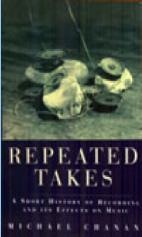Repeated Takes, A Short History of Recording and its effect on Music
Verso, 1995
 “Until the development of the radio and the gramophone, people only heard music when they played it themselves or when they heard other people playing it. Music was bound by time and space. Now, music is everywhere, streaming through the interstices between the lumpy materials of life, filling the gaps in the continuum of human activity and contact, silting up in vast unchartable archives. In Repeated Takes, Michael Chanan has written a concise history of the technology that has wrought this change and the commercial and creative forces that have shaped it. His account is elegant and impressively well-informed. He ranges across the entire technical field, from Edison’s invention of the phonograph in 1877 to the samplers and MIDI technology of the Nineties. He tracks in detail the peristaltic movements of the market, as it ingests and digests each technical innovation and reacts to and directs the whim of the punters and the creativity of musicians. And he has a strong grasp of the way different musical cultures – different ‘musics’ – from Machaut to Maderna, Tin Pan Alley to dub reggae, have adapted themselves to the revolution they have been caught up in, and been changed by it.” Nicholas Spice, London Review of Books, 6.7.9
“Until the development of the radio and the gramophone, people only heard music when they played it themselves or when they heard other people playing it. Music was bound by time and space. Now, music is everywhere, streaming through the interstices between the lumpy materials of life, filling the gaps in the continuum of human activity and contact, silting up in vast unchartable archives. In Repeated Takes, Michael Chanan has written a concise history of the technology that has wrought this change and the commercial and creative forces that have shaped it. His account is elegant and impressively well-informed. He ranges across the entire technical field, from Edison’s invention of the phonograph in 1877 to the samplers and MIDI technology of the Nineties. He tracks in detail the peristaltic movements of the market, as it ingests and digests each technical innovation and reacts to and directs the whim of the punters and the creativity of musicians. And he has a strong grasp of the way different musical cultures – different ‘musics’ – from Machaut to Maderna, Tin Pan Alley to dub reggae, have adapted themselves to the revolution they have been caught up in, and been changed by it.” Nicholas Spice, London Review of Books, 6.7.9
“Implanted in our awareness to the point of transparency, the mechanical reproduction of sound has increasingly conditioned 20th-century artistic experience, yet has done so in ways we take for granted. Michael Chanan dredges up its story from our collective experience. More than that, in Repeated Takes he draws conclusions and comes up with come pretty credible analyses and explanations. Like Henry Petroski in The Evolution of Useful Things, Chanan dispels the myth that things are invented through the pure force of genius in due season…The final chapters on new technology and its effect on copyright make fascinating reading for anyone connected with the music industry.” Nicholas Williams, New Statesman and Society, 7.7.9
“No strangers to the studio craft of overdubbing and effects, on Kid A/Amnesiac Radiohead finally and utterly abandoned the performance model of rock recording and went fully into concocting sonic fictions using the mixing desk as instrument. Answering a fan’s query on Radiohead’s Web forum, Greenwood talked about being obsessed with “the whole artifice of recording. I see it like this: a voice into a microphone onto a tape, onto your CD, through your speakers is all as illusory and fake as any synthesizer–it doesn’t put Thom in your front room. But one is perceived as ‘real’, the other somehow ‘unreal’… It’s the same with guitars versus samplers. It was just freeing to discard the notion of acoustic sounds being truer.” Speaking on the phone, Greenwood says the idea was influenced by reading Michael Chanan’s 1995 meditation on recording, Repeated Takes. “The more concerts we do, the more dissatisfied we get with trying to reproduce the live sound on a record. In a way it can’t be done, and that’s a relief really, when you accept that, and recording just becomes a different thing.” The Wire, 2001

Pingback: Ideas :: Living and Creating in the Exponential Age | weird canada